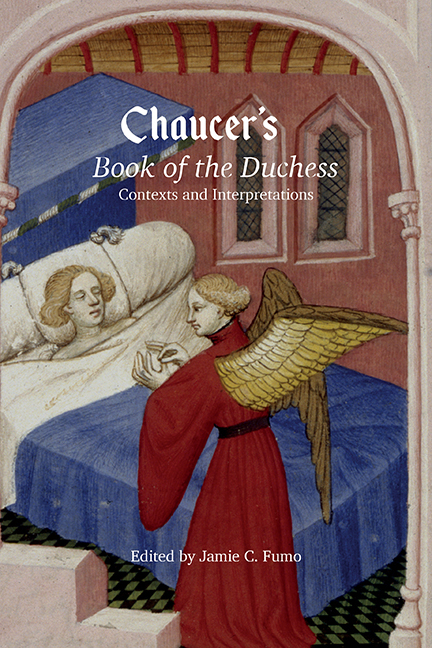Book contents
- Frontmatter
- Contents
- List of Illustrations
- Acknowledgments
- List of Contributors
- Abbreviations and Editions
- Introduction: Reopening the Book of the Duchess
- I Books and Bodies
- 1 Codicology, Text, and the Book of the Duchess
- 2 Idleness, Chess, and Tables: Recuperating Fables in Chaucer's Book of the Duchess
- 3 ‘Noon other werke’: The Work of Sleep in Chaucer's Book of the Duchess
- 4 Discovering Woe: The Translation of Affect in Chaucer's Book of the Duchess and Spenser's Daphnaïda
- II The Intertextual Duchess
- Bibliography
- Index
- Miscellaneous Endmatter
3 - ‘Noon other werke’: The Work of Sleep in Chaucer's Book of the Duchess
from I - Books and Bodies
Published online by Cambridge University Press: 18 April 2018
- Frontmatter
- Contents
- List of Illustrations
- Acknowledgments
- List of Contributors
- Abbreviations and Editions
- Introduction: Reopening the Book of the Duchess
- I Books and Bodies
- 1 Codicology, Text, and the Book of the Duchess
- 2 Idleness, Chess, and Tables: Recuperating Fables in Chaucer's Book of the Duchess
- 3 ‘Noon other werke’: The Work of Sleep in Chaucer's Book of the Duchess
- 4 Discovering Woe: The Translation of Affect in Chaucer's Book of the Duchess and Spenser's Daphnaïda
- II The Intertextual Duchess
- Bibliography
- Index
- Miscellaneous Endmatter
Summary
Dream-visions are perhaps the most self-reflexive of medieval literary genres. They purport to open a window into the minds, indeed, to bare the very souls of their narrators, if not those of the authors themselves. Moreover, in exploring the conditions of their genesis and the materials out of which they are made, dream-visions are an intensely metafictional genre. As Helen Phillips and Nick Havely observe in the introduction to their edition of Chaucer's dream-visions, ‘Late-medieval poets seem less interested in fictional dreams as mirrors of real-life dreaming than as mirrors of the imagination, consciousness and literary composition.’ But what about the sleep that precedes dreams? Are representations of sleep merely a literary precondition that mimics the physiological one, a purely conventional stage through which narrators must pass in these texts? If so, why are some literary dreams prefaced by lengthy representations of sleep (and sometimes, as in Book of the Duchess, its ‘defaute’ [5]) while others mention it only in passing or not at all? In this essay I will explore some of the ways in which sleep serves as a particularly useful vehicle for poets whose metafictions sought to probe the boundary between physical and mental phenomena.
In ‘Sleep, Dreams, and Poetry in Chaucer's Book of the Duchess’, Lisa Kiser observes that ‘no one has yet satisfactorily explained why this Chaucerian persona is introduced in a belabored and self-conscious passage on his sleeplessness, a passage that appears to most readers to act as a lengthy digression instead of a true prologue to the poem's issues and theme’. Kiser argues that the theme of sleeplessness unifies the poem around a metaliterary concern. ‘If, as many critics have suggested, dreams are metaphors for the activities and results of the poetic imagination in medieval courtly works, then Chaucer's sleeplessness in the first lines of this poem represents not only his failure to dream, but also his inability to write’, Kiser suggests. ‘For a poet, whose business is to create well and to create often, sleeplessness results in a poetically barren state of mind, a period of disturbingly unproductive idleness.’
- Type
- Chapter
- Information
- Chaucer's Book of the Duchess , pp. 51 - 70Publisher: Boydell & BrewerPrint publication year: 2018

